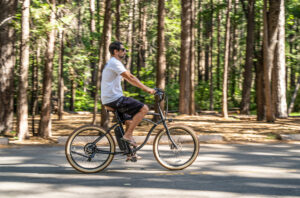There is a joke told in transit circles about people who ride electric bicycles: How do you know if someone has an e-bike? They’ll tell you. The idea, of course, is that users of the battery-powered two-wheelers tend to be proselytizers for the technology.
Take Monte Paulsen, a building energy consultant in Vancouver, British Columbia, who used to drive a car five days a week. A former “fair-weather cyclist,” he rode his bike maybe twice a month, weather permitting.
The pandemic, he decided, was a good time to buy a RadWagon, an electric cargo bike from Rad Power Bikes, a top-selling e-bike company. Now, Mr. Paulsen said, he makes 90 percent of his trips on it.
“I started as a personal experiment to see how I could lower my carbon footprint,” he said. “I’ve stuck with it because it’s really fun.”

 So, asks a drop-in visitor to Princeton eBikes: Is this a bicycle or a motorcycle?
So, asks a drop-in visitor to Princeton eBikes: Is this a bicycle or a motorcycle? Often customers come into our shop wondering if they will get the exercise they want using an electric bike, as people typically are looking for a way to start or continue exercising. More and more research is being done as electric bikes become more popular and many studies have shown that ebikes improve riders’ fitness by increasing people’s likelihood of riding and encouraging people to ride longer. In addition, while ebikes provide the extra push when needed, they still require effort.
Often customers come into our shop wondering if they will get the exercise they want using an electric bike, as people typically are looking for a way to start or continue exercising. More and more research is being done as electric bikes become more popular and many studies have shown that ebikes improve riders’ fitness by increasing people’s likelihood of riding and encouraging people to ride longer. In addition, while ebikes provide the extra push when needed, they still require effort.